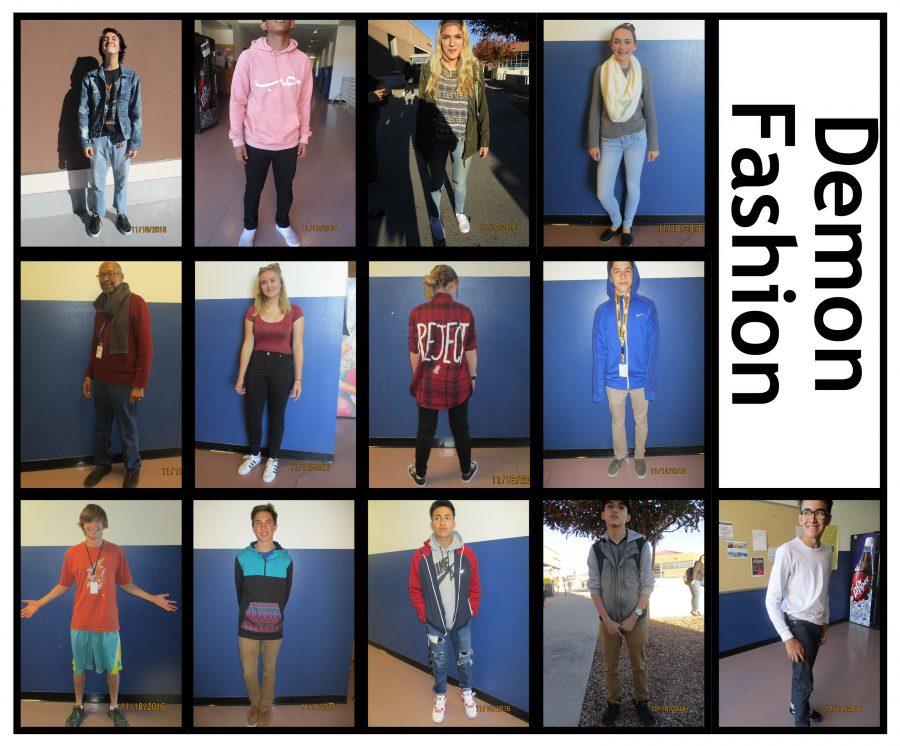Fashionista Manifesto: Are We Really What We Wear?
December 6, 2016
Fashion. We might not see ourselves as fashion “enthusiasts,” or like Coco Chanel, who once said, “I don’t do fashion. I am fashion.” But fashion trends and styles have their own sphere in high school, and what we wear might say something about who we are as unique individuals.
Humanity’s ability to create and wear clothes enables us to distinguish ourselves in a crowd and demonstrate our originality. Conversely, some might use clothing to merge into a crowd to hide their individuality.
Being unique can be hard at times, considering how much backlash we can get if we don’t fit into society’s norms. Let’s take a look at some of these stereotypical styles: There’s the Indie Jesus, with majestic hair, epic beard, vintage sweater, long-sleeve button down, and flip flops. Then there’s the Heavy Metal Knight, with long black hair, Kiss face paint, sleeveless leather shirt, leather pants, and homemade shin guards. Or the TV show fanatic Goth, wearing death from the waist up but contrasting it with pink Dora sweats, pink crocs, and a boots bracelet. And there’s the everlasting Lil Wayne look, with skinny leopard jeans, green shades, white “YOLO” shirt, and Vans.
So what happens when you don’t fit into the norms that society has created?
Although originality is what separates us from everyone else, we are susceptible to the influence that comes from a high school environment. Sophomore Alejandro Gutierrez sees gender roles as part of the problem. “I think society has restricted how people are allowed to express themselves, mainly men,” he said. “Regarding style, women receive much less criticism.”
Then there’s the highly debated question: Are you really what you wear? On the one side there are many who believe your choice of apparel, from “male” clothing on a female or glitter on a male, doesn’t decide anything about you. But that hasn’t stopped certain looks from being associated with sexuality.
Fashion blogger Stephen-Thomas Maciejowski says he has seen trends come and go without blinking an eye, but was taken aback the first time he saw men wearing high heels in a fashion show. He has “since realized that it’s okay for anyone to wear anything.” Instead of judging people for blurring which gender wears what, he reminds himself that society conditions people to only accept gender-fashion norms.
What role does media play in this? Take the hit TV series “What Not to Wear,” for example, a show that, according to Robert Lloyd writing in Critics Notebook for the Los Angeles Times, delivers two messages: There are no ugly women in the world, only ugly clothes, and those can be easily changed; and by changing your clothes, you can change yourself.
The show’s host, Stacy London, said, “It took me a few years to understand that this wasn’t just about wearing a pair of dark-washed jeans; it’s about having the confidence to achieve your goals.” Adding to this confidence talk would be Ben Marino, who said that wearing “tight” outfits gives him confidence he’d never had before.
Aside from the positive self-expression that comes from style, Jasmine Ballard, a sophomore at SFHS, provided a different view on its effects. “Style slightly reflects a person because it is a way to express yourself and show creativity, but it influences people to feel like they have to wear or look a certain way to be accepted,” she said.
And with this talk of self-awareness and heightened interest in looks comes the talk of narcissism. Dr. Lisa Firestone, clinical psychologist and senior editor for Psych Alive, explains, “To me, narcissism is, and I think this holds up in research, desperately wanting to feel good about yourself, and it’s different than feeling good about yourself. It’s not a solid sense of self; it’s a sense of self that needs reinforcement.”
And there to both backslap and support those claims about narcissism comes Diana Vreeland, who said, “I loathe narcissism, but I approve of vanity.” When asked what he wanted to prove with his choice of apparel, Alejandro Gutierrez said, “I don’t want to prove anything. I just like it. I feel fresh.”
Finally there are people who don’t indulge in luxuries such as fashion, either because they cannot afford it or because they choose to put their money and time into other things in their lives. One student who preferred to remain anonymous said, “I don’t really give much attention to it. I have school to worry about, and to tell you the truth I don’t mind what I look like to other people as long as I’m getting things done.”
“With what I wear at this point,” said Sergio Eguino, a sophomore at the Masters Program, “I just stay in my comfort zone.”
Whether clothing is worn as a style to say who you are without actually having to speak, or simply to keep warm, which is essentially what clothes were first designed to do, if there is something we should all get from this — aside from expressing yourself and wearing what makes you feel good — it’s that Indie Jesus is the way to go.



Alejandro • Dec 9, 2016 at 2:09 pm
so coolio